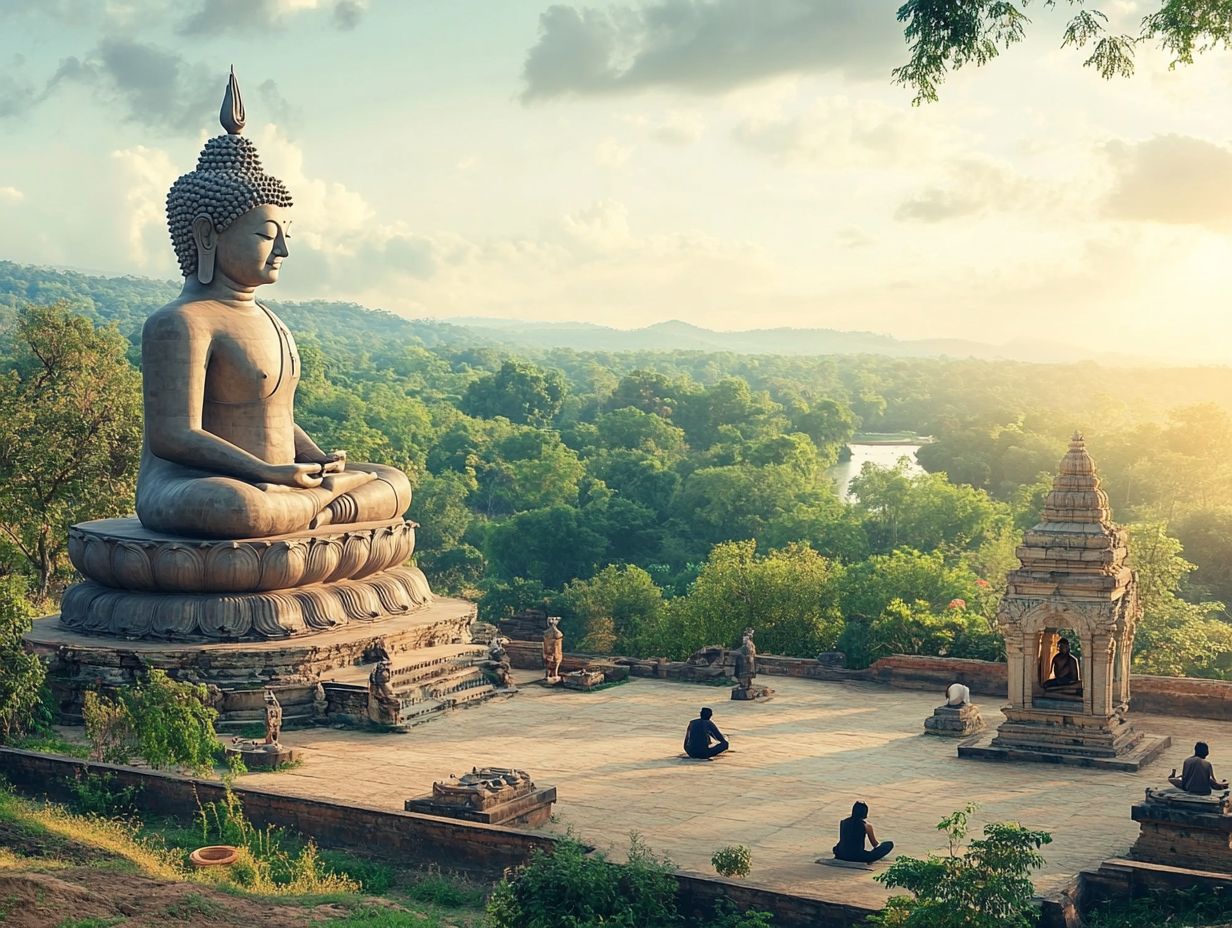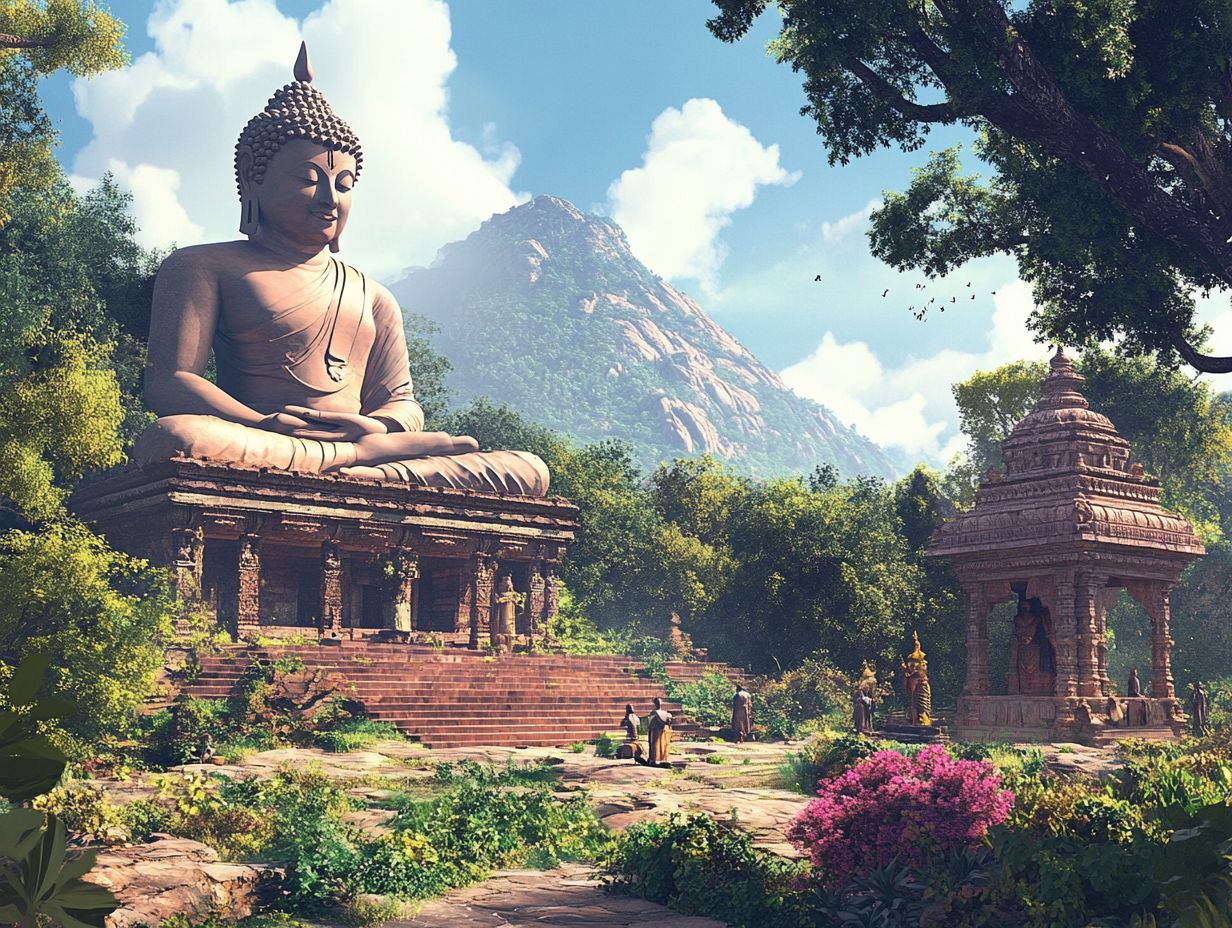How Are Hinduism and Buddhism Similar?
Hinduism and Buddhism, two of the world’s most ancient religions, weave a rich tapestry of beliefs, rituals, and practices that have profoundly shaped Eastern spirituality over millennia. Both faiths emerge from a shared cultural and philosophical heritage, yet they also diverge in significant ways that warrant exploration.
This examination delves into the similarities, such as beliefs in reincarnation, mindfulness, and the pivotal role of karma, while also highlighting notable differences, including their distinct views on God and the caste system.
By analyzing their societal impacts, one can truly appreciate how both religions continue to influence art, philosophy, sacred symbols, and the spiritual landscape in contemporary times.
This journey invites one to traverse the fascinating intersections and contrasts between Hinduism and Buddhism, shedding light on their enduring legacies and spiritual evolution.
Similarities between Hinduism and Buddhism

Hinduism and Buddhism, two of the most prominent religions emerging from the Indian subcontinent, exhibit remarkable similarities in their fundamental beliefs and practices, profoundly influencing the spirituality of millions around the globe. To explore these shared beliefs further, you can read about what beliefs do Hinduism and Buddhism share?
Both traditions highlight the principles of karma and dharma, which serve as guiding frameworks for moral and ethical conduct. Their mutual recognition of reincarnation and the quest for enlightenment underscores their deep interconnectedness and shared spiritual practices.
Meditation practices, the commitment to non-violence (ahimsa), and a rich array of rituals and philosophical discourses are intricately woven throughout their sacred texts, including the Vedas and the Tripitaka.
This confluence of beliefs not only illuminates the profound historical ties between the two religions but also underscores their enduring significance in the realm of contemporary spirituality and holistic well-being.
1. Belief in Reincarnation
Both Hinduism and Buddhism embrace a profound belief in reincarnation, encapsulated in the concept of samsara a cycle of rebirth that symbolizes the soul’s continuous voyage through various forms of existence and life cycles.
This cycle serves as a metaphor for the evolving path of consciousness, as it learns and matures through each life experience. In Hinduism, the ultimate aspiration is to attain moksha, a state of liberation that emancipates the soul from the confines of samsara, allowing it to reunite with the divine essence and sacred geography.
In contrast, Buddhism aims for the realization of nirvana, an enlightened state that signifies the cessation of suffering and liberation from the relentless cycle of rebirth, often achieved through asceticism and meditation practices.
Both philosophies emphasize the significance of moral actions, spiritual development, and self-realization as essential components in breaking free from this perpetual loop, enabling individuals to transcend their limitations and achieve a more elevated spiritual existence, thus fostering a deeper awareness.
2. Emphasis on Karma
The principle of karma, which posits that every action carries consequences, stands as a central tenet in both Hinduism and Buddhism, guiding adherents in their ethical conduct and moral values.
This belief significantly shapes the followers understanding of their responsibilities in the world, influencing their approach to dharma, or moral duty. Within this framework, karma underscores the importance of ethical decision-making, where positive actions result in favorable outcomes, while negative actions lead to adverse repercussions. This is often reflected in karma yoga and other communal practices.
Such a perspective encourages individuals to reflect mindfully on their behavior and its implications, cultivating a sense of accountability. By weaving together the concepts of ethics and consequences, both religions foster a profound awareness of how one s actions extend beyond the self, affecting not only one’s own life but also the lives of others within the broader community.
3. Practice of Meditation
Meditation holds a significant place in both Hinduism and Buddhism, acting as a pathway to mindfulness, self-realization, and the pursuit of enlightenment. This ancient practice encompasses a wide range of techniques, including mantra recitation and yoga in Hinduism, each meticulously crafted to cultivate awareness and enhance one’s spiritual journey.
In Hinduism, practices such as mantra recitation and yoga serve as essential tools for individuals seeking to connect with the divine and explore the depths of their consciousness. In contrast, Buddhism prioritizes methods like Vipassana and Metta meditation, which delve into the nature of suffering and promote the development of compassion and other reflective practices.
Both traditions are dedicated to guiding practitioners toward profound spiritual experiences, enabling them to transcend the material world and attain a lasting sense of inner peace and unity with existence, thus achieving holistic well-being.
4. Importance of Non-Violence
Non-violence, known as ahimsa, serves as a cornerstone principle in both Hinduism and Buddhism, highlighting the importance of compassion and ethical conduct towards all living beings. This essential tenet not only shapes the moral framework of these faiths but also acts as a guiding beacon for millions of adherents in their everyday lives, contributing to communal harmony and peace.
In Hindu philosophy, ahimsa is deeply intertwined with the concept of karma, where the belief that every action bears consequences encourages a lifestyle rooted in kindness and respect. Likewise, Buddhism places a strong emphasis on non-violence, as seen in the Eightfold Path, which calls for right action and right speech, urging practitioners to cultivate compassion for all creatures, thereby promoting social justice.
Adherents of these traditions find their behaviors profoundly influenced by the principle of non-violence, resulting in the nurturing of peaceful communities and the promotion of social harmony across a myriad of cultures and enhancing community well-being.
5. Influence of Vedic Traditions
The Vedic traditions, which serve as the bedrock of Hinduism, have profoundly shaped the evolution of Buddhism, particularly regarding rituals, festivals, philosophy, and spirituality.
These ancient practices wove a rich tapestry of shared rituals that both faiths frequently embrace, such as meditation and offerings, underscoring their origins in a common cultural context. Sacred texts, including the Upanishads and subsequent Buddhist scriptures like the Sutras, unveil overlapping philosophical concepts that highlight the pursuit of truth and the essence of existence.
This intricate interplay between the two religions illustrates how spirituality transcends individual beliefs, fostering a mutual understanding that has developed over centuries. Ultimately, it enriches both communities quest for deeper meaning, spiritual awakening, and connection with the divine.
Differences between Hinduism and Buddhism

Hinduism and Buddhism, while sharing a multitude of similarities, also present notable differences in their beliefs, practices, traditions, and interpretations of fundamental concepts.
These distinctions encompass their perspectives on the nature of gods and deities, the caste system, and the pathways to enlightenment, such as bhakti in Hinduism and the Eightfold Path in Buddhism.
1. Concept of God
The concept of divinity in Hinduism is marked by a profound belief in a multitude of deities, intricately woven into a framework that embraces both monism and dualism. In contrast, Buddhism tends to eschew the notion of a creator god, placing greater emphasis on the quest for ultimate reality and existential questions.
Hindu practitioners immerse themselves in a rich tapestry of gods and goddesses, each representing distinct facets of existence creation, preservation, and destruction among them. This belief system exemplifies the dualistic nature of reality, wherein individual souls (atman) are viewed as unique entities yet intimately connected to the all-encompassing cosmic spirit (Brahman) and sacred geography.
Conversely, Buddhism presents a non-theistic viewpoint, positing that true enlightenment arises from a deep understanding of suffering and the self, rather than through the veneration of deities. In this tradition, the pursuit of ultimate reality is navigated through practices such as mindfulness and meditation techniques, moving away from the dualistic interpretations prevalent in Hindu thought.
This fundamental divergence encourages a more profound contemplation of how these two traditions understand existence and the divine.
2. Views on the Caste System
Hinduism traditionally regards the caste system as an essential social hierarchy woven into its very fabric, whereas Buddhism champions the principle of equality, dismissing caste distinctions and advocating for moral conduct rooted in individual actions and ethical frameworks.
This fundamental contrast carries profound implications, shaping not only personal behavior but also the broader social dynamics within these cultures. In Hinduism, the caste system provides a framework wherein individuals are frequently evaluated based on their birth and lineage, resulting in a set of expectations and obligations that inform their moral conduct and societal roles.
In stark contrast, Buddhism s egalitarian stance encourages individuals to cultivate compassion and mindfulness, underscoring that moral actions are dictated by one’s intentions rather than by caste affiliation, thus promoting social justice and peace.
Such differences create a sense of community and inclusiveness within Buddhism, while the rigid structure of the caste system in Hinduism can sustain divisions, impacting social mobility and the relationships among various groups, thus influencing societal roles and community interactions.
3. Attitude towards Materialism and Metaphysics
Buddhism frequently underscores the importance of detachment from material possessions as a pathway to enlightenment, standing in contrast to Hinduism, which offers a more nuanced perspective on the interplay between material wealth and spiritual practice, rooted in sacred texts like the Vedas and Sutras.
While Buddhism promotes asceticism and advocates for the renunciation of possessions, viewing attachment to material goods as an impediment on the journey to enlightenment, Hinduism presents a more intricate relationship with wealth. In Hindu thought, material abundance is not inherently viewed as detrimental; rather, it can be regarded as a manifestation of dharma when approached with responsibility and ethical considerations. This viewpoint facilitates the harmonious coexistence of spiritual aspirations and material endeavors, encouraging a balanced way of life that aligns with moral principles such as non-violence (ahimsa).
Therefore, while Buddhist practitioners may strive to distance themselves from worldly attachments, Hindus often embrace the notion that prosperity can indeed accompany spiritual growth, provided that one remains anchored in the right intentions and ethical conduct.
4. Role of Rituals and Worship
Rituals and worship hold a pivotal position in Hinduism, encompassing a rich tapestry of practices and sacred rituals, while Buddhism places greater emphasis on individual spiritual pursuits and mindfulness, often eschewing ritualistic worship.
In Hinduism, communal rituals such as vibrant festivals, temple ceremonies, and large gatherings cultivate a profound sense of togetherness among practitioners, strengthening social bonds within the community. These celebrations not only signify expressions of faith but also foster an environment of shared joy and cultural identity, reflecting the religion s deep-seated cultural heritage.
In contrast, Buddhism prioritizes personal meditation and self-reflection, inviting individuals to embark on their unique spiritual journeys toward enlightenment. This solitary practice underscores the significance of personal growth, existential questions, and introspection, enabling followers to delve into the complexities of their own minds, ultimately leading to a profound comprehension of life s impermanence.
Thus, while both religions present rich spiritual experiences, the ways in which rituals and worship are expressed reveal their distinct foundational philosophies.
5. Path to Enlightenment
The journey toward enlightenment reveals a stark divergence between Hinduism and Buddhism. Buddhism delineates a structured framework through the Four Noble Truths and the Eightfold Path, offering a clear roadmap for practitioners. In contrast, Hinduism presents a rich tapestry of paths, including karma yoga and bhakti, allowing for a more individualized spiritual exploration, rooted in its ancient wisdom.
Within Buddhism, followers adhere to these guiding principles to cultivate wisdom, ethical conduct, and mental discipline, all with the ultimate aim of alleviating suffering and attaining Nirvana (liberation). Conversely, Hinduism embraces a pluralistic perspective, inviting adherents to select their spiritual pathways based on personal inclinations and life circumstances, aiming for moksha.
Through avenues such as jnana yoga, the pursuit of knowledge, and dhyana yoga, the practice of meditation, seekers can delve deeply into their inner selves. Ultimately, both traditions offer invaluable resources for personal transformation and spiritual development, steering individuals toward profound self-realization and enlightenment, contributing to their spiritual evolution.
6. Influence of Other Religions

Both Hinduism and Buddhism have been intricately intertwined with other religious traditions throughout the centuries, reflecting their profound historical roots and cultural influence on a global scale, contributing to the religious diversity of the world.
This dynamic interplay between these two ancient faiths and others such as Jainism, Sikhism, and even elements of Shintoism and Taoism creates a vibrant tapestry of cultural exchange. Through trade routes, migration, and the dissemination of philosophical ideas, aspects of Hindu and Buddhist thought have permeated various societies, resulting in significant adaptations in rituals, beliefs, and ethical frameworks, underscoring their interconnectedness and cultural influence.
For example, the concept of karma has transcended its original context to resonate within Western thought, demonstrating how these spiritual legacies continue to inspire ongoing dialogues about morality and existence. Such interactions underscore the profound ways in which these traditions have not only coexisted but have also enriched one another, fostering a deeper understanding of spirituality and interconnectedness across diverse cultures.
Impact of Hinduism and Buddhism on Society
Hinduism and Buddhism have profoundly influenced societies, shaping cultural practices, philosophical discourses, and ethical standards. Together, they weave a rich tapestry of traditions, rituals, and festivals that resonate deeply within contemporary life, contributing to a shared cultural heritage.
1. Spread of Eastern Philosophy and Practices
The dissemination of Eastern philosophy and practices, deeply rooted in Hinduism and Buddhism, has witnessed remarkable growth in an increasingly globalized landscape, fostering spiritual awakening and mindfulness across a multitude of cultures, promoting holistic well-being.
As individuals in search of profound meaning and connection gravitate toward these ancient traditions, the impact of these philosophies begins to seep into various facets of Western societies, influencing health, psychology, and lifestyle choices. The principles of yoga, meditation, and the notion of dharma have seamlessly integrated into daily life, promoting a holistic approach to well-being and encouraging spiritual practices.
This rich cross-cultural exchange, propelled by the internet and social media, not only enhances personal experiences but also nurtures a deeper understanding of the interconnectedness of humanity. Such interactions underscore the vital role these spiritual teachings play in navigating the complexities of contemporary existence, championing a path that transcends superficial materialism, fostering unity in diversity.
2. Influence on Art and Architecture
Hinduism and Buddhism have undeniably shaped the realms of art and architecture, inspiring the creation of sacred spaces that resonate with their spiritual and philosophical ideals, incorporating sacred symbols and sacred geography.
These two prominent religions have woven a rich tapestry of cultural influences, evident in the intricate carvings of Hindu temples and the serene yet imposing stupas associated with Buddhism. Structures like the exquisite Brihadeeswarar Temple in Tamil Nadu exemplify the grandeur of Hindu cosmology, adorned with vibrant sculptures that narrate divine stories. In parallel, the iconic Shwedagon Pagoda in Myanmar stands as a monumental testament to Buddhist devotion, with its golden stupa symbolizing the pursuit of enlightenment and sacred pilgrimage.
Through these magnificent edifices and artistic expressions, both faiths not only celebrate their historical narratives but also extend an invitation for individuals to engage in meditative experiences that transcend the ordinary, promoting spirituality development.
3. Contribution to World Religions
The contributions of Hinduism and Buddhism to the realm of world religions are undeniably profound, presenting unique philosophical insights and teachings that continue to captivate millions across the globe. These ancient traditions have established foundational concepts such as karma, dharma, and meditation, significantly shaping a wide array of spiritual practices and beliefs within diverse cultures. Their sacred texts, such as the Vedas and Sutras, offer deep philosophical concepts and guide followers on their path to liberation.
Their intricate tapestry of rituals and philosophies invites individuals to pursue inner peace, mindfulness, and a deeper comprehension of the self. The emphasis on compassion and non-violence (ahimsa) inherent in both religions has transcended their origins, fostering social harmony and ethical living in various societies worldwide.
As spirituality continues to evolve, the core tenets derived from these two faiths retain their relevance, encouraging interfaith dialogue and enhancing the collective quest for meaning in life, contributing to a deeper understanding of universal truths.
Frequently Asked Questions
How Are Hinduism and Buddhism Similar?

Hinduism and Buddhism share many similarities, as they both originated in India and have influenced each other’s beliefs and practices throughout history. Some key similarities between the two religions include:
What are the main beliefs shared by Hinduism and Buddhism, reflecting their common philosophical concepts?
Both Hinduism and Buddhism believe in the concept of karma, the cycle of rebirth (samsara), and the ultimate goal of achieving enlightenment or liberation. They also share similar ethical principles, such as nonviolence (ahimsa), compassion, and selflessness.
How do Hinduism and Buddhism view the role of gods and divine beings?
Hinduism and Buddhism have different perspectives on the role of gods and deities. Hinduism worships many gods and goddesses, while Buddhism does not believe in a supreme deity. However, both religions recognize the existence of higher beings and have similar practices of devotional worship, reflecting their shared spiritual practices.
What is the significance of meditation practices in Hinduism and Buddhism?
Both Hinduism and Buddhism place great importance on meditation as a means to achieve spiritual growth and enlightenment. In both religions, meditation involves quieting the mind and focusing on the present moment, leading to a deeper understanding of oneself and the universe, contributing to their rich traditions of reflective practices.
Are there any common rituals or sacred practices between Hinduism and Buddhism?
Yes, there are several shared rituals and practices between Hinduism and Buddhism. These include offerings of food and flowers, lighting incense, and performing puja (worship) at temples or shrines. Both religions also share similarities in practices like chanting mantras, performing prostrations, and engaging in meditation practices for spiritual development and enlightenment.
Do Hinduism and Buddhism have any shared symbols or icons?
Yes, there are several symbols and icons that are shared between Hinduism and Buddhism. For example, the lotus flower, which represents purity and enlightenment, is a common symbol in both religions. The swastika, a symbol of good luck and well-being in Hinduism, is also used in some forms of Buddhism. Additionally, sacred texts like the Vedas in Hinduism and the Sutras in Buddhism reflect shared philosophical concepts, including karma, dharma, and the cycle of reincarnation. Both religions also emphasize the importance of ethical conduct, non-violence (ahimsa), and the pursuit of spiritual growth through practices such as yoga and meditation.
